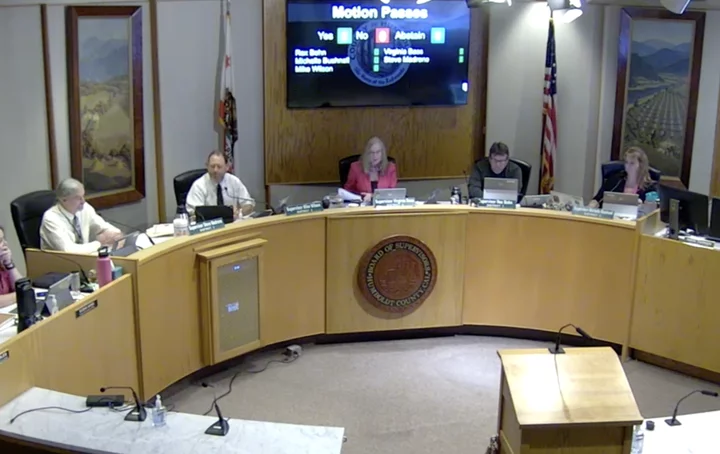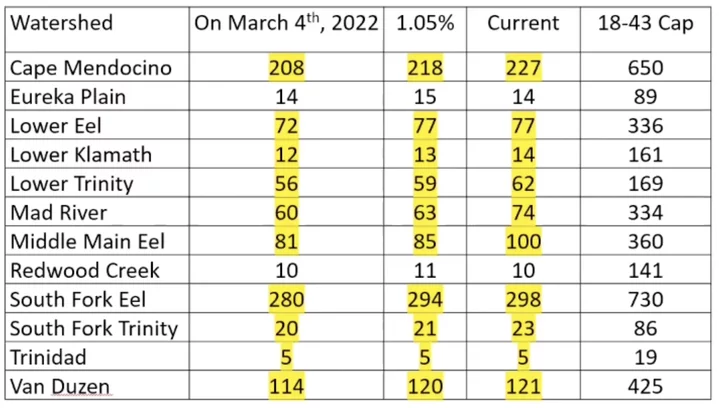The Humboldt County Board of Supervisors (from left): Fifth District Supervisor Steve Madrone, Third District Supervisor Mike Wilson, Chair and Fourth District Supervisor Virginia Bass, First District Supervisor Rex Bohn and Second District Supervisor Michelle Bushnell. | Screenshot.
###
PREVIOUSLY: An Initiative to Reshape Humboldt’s Cannabis Industry Qualified for the Ballot, and It Has Growers Worried
###
The Humboldt County Board of Supervisors had just three options, and they didn’t seem too happy about any of them.
On Tuesday the board was presented with an initiative that, if approved by voters, would effectively prohibit new cannabis-growing operations countywide while ushering in a host of stringent new rules for industry, including a prohibition on farms larger than 10,000 square feet.
The board listened to two hours of passionate public feedback, the vast majority of it from local growers who lambasted the initiative as an ill-conceived and deceptively promoted measure that would destroy their livelihoods and decimate the storied Humboldt County cannabis industry.
But backers of the initiative — a relatively small group of retirees living in Kneeland — had submitted more than 7,000 signatures supporting their petition, more than enough to qualify the measure for ballot. The signatures had been approved by the Elections Office, and so per California law, the board could only do one of three things:
- adopt the ordinance without alteration, either right there in the meeting or within the next 10 days,
- submit the ordinance to the voters (again, without changing anything) at the next available statewide election — in this case, the California primary in March of 2024, or
- direct staff to prepare a report on the ordinance, and when that report is presented at a subsequent meeting either adopt the ordinance or order a special election, which would cost the county $35,000 to $40,000.
Somewhere around the nine-hour mark of an 11-hour meeting, the board unanimously chose option 2, agreeing to put the measure on the March 2024 ballot, though before taking the vote several supervisors — particularly Fifth District Supervisor Steve Madrone — indicated that they’d like to work toward an alternative outcome.
Madrone asked Betsy Watson, one of the two organizers present for the meeting, if she and her fellow organizers would be willing to work with the county and the community over the next year-and-change to explore other ways to modify the county’s cannabis regulations — and maybe even pull their initiative off the ballot.
Watson agreed. “Anything can be improved,” she said, adding, “We would would demand, though, that it not just be cannabis people that are being consulted and negotiated with. … What we would need to do is to consult a broad level of the community so we can all live here.”
The board also directed staff to prepare a report analyzing the potential impacts of the initiative and suggesting possible next steps.
As mentioned in a story from last week, the organizers of this initiative feel that the weed industry has run amok in Humboldt County, with the proliferation of what they see as industrial-scale cultivation activities that have dramatically impacted their way of life, threatening their water supplies, increasing traffic and harming the environment.
Their year-long organizing and signature-gathering effort led to the Humboldt Cannabis Reform Initiative, which was subsequently (and rather unfortunately) renamed the Large-Scale Commercial Cannabis Cultivation Restrictions Amending Humboldt County General Plan, Local Coastal Plans and County Code Amendments Initiative.
Early in yesterday’s hearing, Second District Supervisor Michelle Bushnell asked Planning and Building Director John Ford, “With this petition, what does it mean to cultivators that are already licensed? And what does it mean to future cultivators?”
“What it will essentially do,” Ford replied, “is prohibit new applications for cultivation.” He explained that the initiative would set new caps on the number of permits allowed in each watershed, limiting them to five percent above the number of permitted operations present on March 4 of this year. He displayed a spreadsheet (screenshot below) showing that this cap has already been exceeded in all but two watersheds countywide.
Screenshot of a slide from a staff presentation.
“And as you can see,” Ford said, “there are actually only two permits left to be allocated.”
The initiative would also require all cultivation sites to be located on roads that meet Category 4 standards, Ford said, which is not currently the case under either version 1.0 or version 2.0 of the county’s commercial cannabis land use ordinance (though roads that don’t meet those standards must be analyzed for capacity).
Existing permit-holders with operations larger than 10,000 square feet would be considered “legal non-conforming” operations upon implementation of the initiative, Ford explained.
“They will continue to be legal permits,” he said, but because the ordinance now limits new permits to 10,000 square feet, they couldn’t expand. And there’s some question as to how much they could modify their property. Could they add water tanks? Could they add solar power? Could they do some other things that may make a lot of sense and be highly beneficial from an environmental standpoint?”
He said the language of the ordinance seems to indicate that such changes would require a discretionary permit, and for operations larger than 10,000 square feet, those types of changes wouldn’t be allowed at all.
The initiative also says that multiple permits cannot be held by an individual or on a given property, “and is unclear if that just cannabis cultivation permits or [if] that includes nursery, processing, distribution, manufacturing, canna-tourism, micro-business — things that in [ordinance] 2.0 the county was very intentional about wanting to have value added, particularly to small farmers, so that they could have secondary sources of income to support the cannabis cultivation,” Ford said.
Bushnell challenged the ordinance backers on a number of issues, asking them to explain why they consider 10,000 square feet an industrial-scale operation.
First District Supervisor Rex Bohn also pushed back on that notion, saying, “That’s not industrial.” He also said he feels the initiative was misrepresented by backers, who tried to get him to sign their petition by saying it would take out the “mega-grows.”
Bushnell was distressed.
“My heart’s racing right now,” she said to the petitioners. She took issue with them singling out the cannabis industry.
“And I don’t understand. I don’t understand why you targeted only cannabis. … And I won’t support [the initiative] the way it’s written. I respect you, you know, but I am so sad for the cannabis community, for the departments that have worked so hard to bring this forward, for this board that has worked hard to try to make this work. And [cannabis farmers] are on their knees. They’re broke. Cannabis is failing. And they’re struggling for everything to keep their livelihood, and now they have anxiety again because of this. And it just breaks my heart. It does.”
Third District Supervisor Mike Wilson asked staff what qualifies as a large-scale grow, and Ford said that to have anything larger than an acre, the property must be at least 320 acres.
Wilson interjected to say he was looking for a definition of large-scale, “because this ordinance defines large-scale as anything 10,000 square feet or more. … The title is defining it before we as a community vote to define it.”
Watson stepped up to the podium shortly thereafter to defend the ordinance. She said that in general she’s not a fan of the initiative process, saying, “There was an initiative in this state that kept me from getting married.” But she added that she and her neighbors were unable to get results any other way.
“While gathering 7,000 signatures we found that citizens felt overlooked,” Watson said. “There’s the perception that this whole thing is completely out of control. … We’re offering a forward-looking plan. It’s a vision for cannabis cultivation in the future. We are not anti-cannabis people at all.”
The public comment period kicked off with Ross Gordon, policy director for the Humboldt County Growers Alliance, a cannabis business organization. He criticized the title and content of the initiative as well as the process by which it came to the board.
“These rules and restrictions were developed without public process and input,” Gordon said. “Many are not viable to implement or comply with, as Director Ford spoke to, and many would result in the bureaucratic strangulation of the small cannabis farms in Humboldt County.”
He said he believes there were two main reasons why more than 7,000 people signed the petition.
“The first is that they falsely believed that this was an initiative primarily about restricting large-scale commercial cannabis cultivation in Humboldt County, and they believed the stated purpose and intent: to support small farmers,” he said. “I believe if they knew what was actually in this initiative, many people would not have signed it.”
Dozens of growers spoke over the next two hours, and several refrains were heard over and over again. Many said they’re struggling to survive and that this initiative would be the final nail in the coffin for their operations. Others asked the supervisors to formally oppose the initiative and maybe come up with an alternative one themselves. Many said the measure would destroy the industry altogether here in Humboldt County.
“I suggest that we request a full and robust report on this initiative … ,” farmer Nate Whittington said. “Let [voters] see the facts of just how absurd this initiative is, and I think we’ll see that the county will resoundingly vote it down, and then we can move on to more productive discussions.”
Nik Erickson, owner of Full Moon Farms, said the organizers failed to consult the industry. “Small farms were not asked what challenges we were facing, how this initiative would help us and how it would deter corporate cannabis from coming into Humboldt County when in fact it does the exact opposite,” he said. “It creates impossible hurdles for small farms.”
His voice began to tremble as he continued. “This initiative threatens all that we’ve worked so hard for,” he said. “This initiative, in fact, is the extinction of small farms.”
After everyone in board chambers had taken their turn, Board Chair Virginia Bass turned it over to people calling in via Zoom. The thrust of the comments remained the same.
“We are greatly, greatly affected by the overregulation already and with everything we put into our business, our life,” said the owner of Humboldt Renegade Farms. “This was our passion, our livelihood. We can’t take any more. We’re hanging on by a thread. This would really be the nail in the coffin for us.”
When the comment period finally wrapped up, Wilson remarked that the conversation was overdue.
“We shouldn’t have this hearing today; we should have had this hearing the day that there was an initiative put on the table,” he said. Instead, the board was left in what he called “this very locked-in situation” with only the three options.
Madrone pointed out that proponents of an initiative can withdraw it anytime until 88 days before the election, and he implored organizers to engage in discussions.
“I know Betsy to be a person who spent decades in this county working on conflict resolution,” he said, adding that Watson and fellow organizer Mark Thurmond had said they didn’t really want to pursue an initiative in the first place.
“So I’m not going to give up hope,” Madrone continued. “I really believe it is entirely possible for us as a board, working with our community, to figure out: what are the things we can do to make this all better?”
No date was set for when staff will bring back its analysis of the initiative’s impacts, nor did the board iron out a method for working further with the initiative’s proponents. But with the understanding that the conversation will continue, the board voted unanimously to approve the measure for the March 2024 ballot.
###
DOCUMENT: The Humboldt Cannabis Reform Initiative (full text)


CLICK TO MANAGE